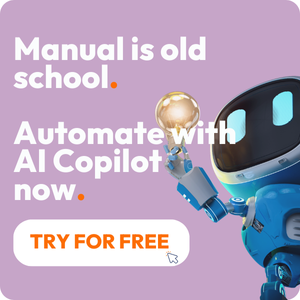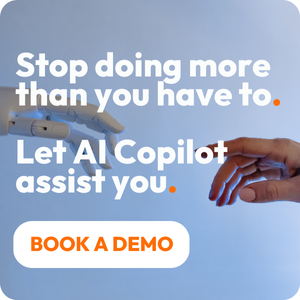Share this
How to Use AI for Project Management (and Not Lose Your Mind)
by Jarno Koopman on March 13, 2025
For countless project managers out there, juggling deadlines, budgets, and teams can feel like herding cats in a hurricane. And in the digital marketing and IT services world, it feels like that hurricane is only getting stronger.
The good news is that you can now use AI as your very own digital superhero. AI tools are making project management more efficient, and dare we say, easier, through lightning-fast analytics and automations.
AI is clearly transforming project management processes and has been for some time. As it gets onboarded by more people across the world, project managers are becoming more savvy at how to best leverage this powerful tool.
That is, we are starting to get better at tips, tricks, shortcuts, and getting the most out of AI.Inspired by our own attempts at becoming more savvy with project management AI, we’ll explain how you can easily use AI to make your projects smoother than a freshly paved highway.
Why AI?
Artificial intelligence is just a fancy way of saying machine learning, and this type of functionality was integrally present in many project management software platforms and PSA solutions long before the ChatGPT boom.
So, why can project managers benefit from a system with machine learning?
AI, particularly generative AI for project management, acts like a super-smart assistant who can analyze data, predict roadblocks, and even help you come up with creative solutions.
If leveraged properly, AI tools for projects can substantially free up time to focus more intently on the big picture and the strategic framework, instead of getting bogged down in the daily minutiae.
Using AI to Manage Your Projects: 5 Tips for Success
Tip 1: Use a Tool Native to Your Project Management Software
First things first, don’t go chasing every shiny new AI app out there. Many of the world’s favorite project management platforms are already integrating AI features directly. This is the best place to start.
It’s chiefly important to look for tools that are somehow integrated with what you’re using for project management, i.e. with all your task data, team time tracking, budget info, etc.
Integration will equate to more seamless workflows, data that’s already in the right place, and less time spent jumping between apps.
Why is this important? Because context matters. AI needs to understand your project’s history, its current status, and your team's dynamics.
When it’s working within your familiar digital environment, it can provide more accurate and relevant insights. It's like having a team member who already knows the project inside and out.
Tip 2: Use AI Like an Assistant to Check on the Health of Your Projects
Imagine having an intelligent assistant who can constantly monitor your projects and flag potential issues before they become full-blown disasters. That’s what AI can do.
AI can analyze project data, identify trends, and spot anomalies that might indicate problems. For example, it can track task completion rates, budget spending, and resource utilization, and then alert you to any deviations from your planning.
Think of it as a health check for your projects. An AI project management assistant, now sometimes called an AI project manager, can give you a quick snapshot of where things stand, highlighting areas that need your attention.
It can tell you if a task is falling behind schedule, if a team member is overloaded, or if the budget is being overspent. You can then proactively address issues and risks, keeping your projects profitable and on track.
Tip 3: Let AI Manage Your Resource Allocation
Resource allocation is a perennial headache for project managers. Who’s available? Who has the right skills for this project? Who’s already overbooked?
AI can take the guesswork out of this process. It can analyze your team’s skills, availability, and workload, and then suggest optimal resource assignments in mere seconds.
Generative AI can even help you create hypothetical scenarios: What happens if you add a new team member? What if you shift resources from one task to another?AI can simulate these scenarios and show you the potential impact on your project. This allows you to make informed decisions and optimize your resource allocation.
Tip 4: Get Better at Prompt Engineering
Here’s where things get really interesting. To get the most out of generative AI, you need to learn how to ask the right questions.
This is called prompt engineering, the art of crafting clear, specific, and effective prompts that elicit the best response from your AI tool for project management.
Think of it like having a conversation with a very intelligent but sometimes unfiltered, uber-literal person. You need to be precise and provide enough context.
For example, instead of asking “What’s the status of the project?” try asking “Based on the current task completion rates and resource utilization, what are the potential risks to the project’s timeline and budget?”
The more specific and detailed your prompts, the better the AI’s responses will be. Experiment with different phrasing, provide examples, and iterate on your prompts until you get the results you’re looking for.
Tip 5: Use Voice for a More Seamless Experience
The fuVoice technology is becoming increasingly sophisticated. Now, project managers are potentially able to update task statuses, assign resources, and check project progress simply by speaking to an AI assistant.
This hands-free approach comes in particularly handy when you’re on the go or when you need to quickly capture or analyze information.
You can use voice commands to create tasks, set reminders, and even generate reports. It’s like having a personal assistant who’s always at your beck and call.
Generative AI and Creativity
Generative AI isn't just about data analysis and efficiency; it's also beneficial on the creative side of project management.
For digital marketing projects, AI can help you brainstorm content ideas, generate copy, and even create visual assets. It can analyze market trends and customer data to identify new opportunities and suggest innovative strategies.
In IT services, AI can help generate code, create documentation, and even troubleshoot technical issues. It can rapidly analyze existing codebases and suggest improvements, helping you to write cleaner, more efficient code.
However, it’s important to remember that AI is a tool, not a replacement for human creativity. It can provide a great deal of inspiration and generate ideas, but it’s still up to human project managers to refine and implement them. AI is merely a collaborator, not a competitor.
The AI-Powered Future of Project Management Processes
Don’t be afraid to experiment, try new things, and push the boundaries of what’s possible with AI’s applications in project management.Once you figure out how AI can actually help you to be a better project manager, you’ll be able to focus exponentially more on the things that matter most, and to deliver projects that exceed expectations.
Share this
- Project Management (102)
- Productivity (63)
- Time Tracking (27)
- PSA Software (26)
- HubSpot (20)
- Resource Management (15)
- Invoicing (12)
- Salesforce (11)
- AI (10)
- Profitability (9)
- Contract Management (7)
- collaboration (5)
- Gantt Chart (4)
- Microsoft Dynamics (4)
- Budget Management (3)
- Consultancy (3)
- Financial services (3)
- Integrations (3)
- Quickbooks (3)
- Quote (3)
- ROI (3)
- Traffic Management (3)
- About PSOhub (2)
- Automation (2)
- Digital Marketing & Advertising (2)
- Pipedrive (2)
- Work Management (2)
- IT Companies (1)
- Product (1)
- Risk Management (1)
- Task Management (1)
- Ticket Sync (1)
- Workload Management (1)
- power bi (1)
- January 2026 (1)
- December 2025 (2)
- November 2025 (3)
- October 2025 (2)
- September 2025 (1)
- August 2025 (1)
- July 2025 (4)
- June 2025 (1)
- May 2025 (5)
- April 2025 (4)
- March 2025 (3)
- February 2025 (3)
- January 2025 (3)
- December 2024 (1)
- November 2024 (5)
- October 2024 (5)
- September 2024 (1)
- August 2024 (4)
- July 2024 (3)
- June 2024 (5)
- May 2024 (4)
- April 2024 (5)
- March 2024 (5)
- February 2024 (4)
- January 2024 (3)
- December 2023 (2)
- November 2023 (6)
- October 2023 (5)
- August 2023 (6)
- July 2023 (2)
- June 2023 (4)
- May 2023 (4)
- April 2023 (3)
- March 2023 (4)
- February 2023 (4)
- January 2023 (3)
- December 2022 (5)
- November 2022 (3)
- October 2022 (4)
- September 2022 (5)
- August 2022 (7)
- July 2022 (1)
- June 2022 (7)
- May 2022 (6)
- April 2022 (2)
- March 2022 (2)
- February 2022 (4)
- January 2022 (4)
- December 2021 (5)
- November 2021 (2)
- October 2021 (2)
- September 2021 (3)
- August 2021 (3)
- July 2021 (2)
- June 2021 (2)
- May 2021 (3)
- April 2021 (2)
- March 2021 (2)
- February 2021 (3)
- January 2021 (5)
- December 2020 (4)
- November 2020 (2)
- October 2020 (4)
- September 2020 (5)
- August 2020 (4)
- July 2020 (4)
- June 2020 (1)
- May 2020 (4)
- April 2020 (8)
- March 2020 (7)
- January 1970 (1)




